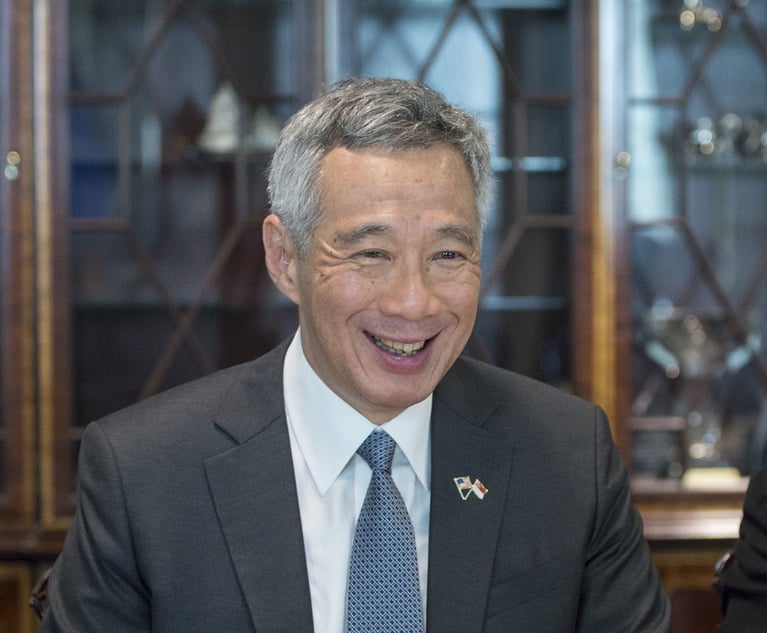Hong Kong opens second round of higher rights of audience applications
The Hong Kong Law Society is this month accepting the second round of applications from solicitors for higher rights of audience (HRA) following new legislation introduced last year allowing non-barristers to appear in court. Solicitors from local and international law firms have been given one month from 1 September to apply for advocacy rights, with most required to undergo a litigation training programme overseen by the College of Law.
September 11, 2013 at 02:30 AM
3 minute read
The Hong Kong Law Society is this month accepting the second round of applications from solicitors for higher rights of audience (HRA) following new legislation introduced last year allowing non-barristers to appear in court.
Solicitors from local and international law firms have been given one month from 1 September to apply for advocacy rights, with most required to undergo a litigation training programme overseen by the College of Law.
Those with significant advocacy experience can request an exemption from elements of the training process.
"We're taking applications now for the next batch, from 1 September for one month," said Dieter Yih, the former president of the Law Society and current council member.
"Clients need more access to justice. They need a wider selection [of advocates]. At the moment there are only 1,100 barristers in Hong Kong, so the choice is limited. We want to increase [that pool of talent]."
Hong Kong introduced new legislation on the issue last June; taking the first round of applications for HRA in September 2012.
In February, fifteen of the city's top dispute resolution partners – including top-ranked Skadden partner Paul Mitchard QC, Baker & McKenzie duo Gary Seib and Kareena Teh, and Allen & Overy arbitration partner Matthew Gearing – qualified as solicitor advocates after being granted higher rights with exemption from training.
Those urged to apply for the second round include solicitors involved in civil and criminal litigation work, and particularly those with a minimum of five years PQE.
However, some of the city's best-known litigators, including Davis Polk & Wardwell top-ranked disputes partner Martin Rogers and Linklaters global litigation head Marc Harvey, said they are not applying this year due to time constraints.
Alongside the new rules on advocacy, the Law Society is also pushing for more solicitors to become judges.
"Traditionally the pool of judges tends to come from barristers," said Yih. "If you're talking about the high court, court of appeal and court of final appeal, you see very few solicitors who are judges.
"One of the difficulties we have faced in the past – and the same argument goes for why solicitors cannot be appointed senior counsel – is the argument that solicitors do not have sufficient advocacy skills.
"But now with higher rights of audience and the appointment of solicitor advocates, it is obviously recognised that these people have the sufficient level of advocacy skills.
"We have been very active and very vocal about [this]. These solicitor advocates should be getting the same treatment as barristers. We think this is one of the ways that the judges shortage could be addressed."
Related: Top firms aim to win full Hong Kong court rights as market liberalises.
This content has been archived. It is available through our partners, LexisNexis® and Bloomberg Law.
To view this content, please continue to their sites.
Not a Lexis Subscriber?
Subscribe Now
Not a Bloomberg Law Subscriber?
Subscribe Now
NOT FOR REPRINT
© 2025 ALM Global, LLC, All Rights Reserved. Request academic re-use from www.copyright.com. All other uses, submit a request to [email protected]. For more information visit Asset & Logo Licensing.
You Might Like
View All
Singapore Leaders Stress the Importance of the Rule of Law Amid Geopolitical Tensions

Can Law Firms Avoid Landing on the 'Enemy' List During the Trump Administration?
5 minute read

Letter From Asia: Will Big Law Ever Bother to Understand Asia Again?
Trending Stories
Who Got The Work
J. Brugh Lower of Gibbons has entered an appearance for industrial equipment supplier Devco Corporation in a pending trademark infringement lawsuit. The suit, accusing the defendant of selling knock-off Graco products, was filed Dec. 18 in New Jersey District Court by Rivkin Radler on behalf of Graco Inc. and Graco Minnesota. The case, assigned to U.S. District Judge Zahid N. Quraishi, is 3:24-cv-11294, Graco Inc. et al v. Devco Corporation.
Who Got The Work
Rebecca Maller-Stein and Kent A. Yalowitz of Arnold & Porter Kaye Scholer have entered their appearances for Hanaco Venture Capital and its executives, Lior Prosor and David Frankel, in a pending securities lawsuit. The action, filed on Dec. 24 in New York Southern District Court by Zell, Aron & Co. on behalf of Goldeneye Advisors, accuses the defendants of negligently and fraudulently managing the plaintiff's $1 million investment. The case, assigned to U.S. District Judge Vernon S. Broderick, is 1:24-cv-09918, Goldeneye Advisors, LLC v. Hanaco Venture Capital, Ltd. et al.
Who Got The Work
Attorneys from A&O Shearman has stepped in as defense counsel for Toronto-Dominion Bank and other defendants in a pending securities class action. The suit, filed Dec. 11 in New York Southern District Court by Bleichmar Fonti & Auld, accuses the defendants of concealing the bank's 'pervasive' deficiencies in regards to its compliance with the Bank Secrecy Act and the quality of its anti-money laundering controls. The case, assigned to U.S. District Judge Arun Subramanian, is 1:24-cv-09445, Gonzalez v. The Toronto-Dominion Bank et al.
Who Got The Work
Crown Castle International, a Pennsylvania company providing shared communications infrastructure, has turned to Luke D. Wolf of Gordon Rees Scully Mansukhani to fend off a pending breach-of-contract lawsuit. The court action, filed Nov. 25 in Michigan Eastern District Court by Hooper Hathaway PC on behalf of The Town Residences LLC, accuses Crown Castle of failing to transfer approximately $30,000 in utility payments from T-Mobile in breach of a roof-top lease and assignment agreement. The case, assigned to U.S. District Judge Susan K. Declercq, is 2:24-cv-13131, The Town Residences LLC v. T-Mobile US, Inc. et al.
Who Got The Work
Wilfred P. Coronato and Daniel M. Schwartz of McCarter & English have stepped in as defense counsel to Electrolux Home Products Inc. in a pending product liability lawsuit. The court action, filed Nov. 26 in New York Eastern District Court by Poulos Lopiccolo PC and Nagel Rice LLP on behalf of David Stern, alleges that the defendant's refrigerators’ drawers and shelving repeatedly break and fall apart within months after purchase. The case, assigned to U.S. District Judge Joan M. Azrack, is 2:24-cv-08204, Stern v. Electrolux Home Products, Inc.
Featured Firms
Law Offices of Gary Martin Hays & Associates, P.C.
(470) 294-1674
Law Offices of Mark E. Salomone
(857) 444-6468
Smith & Hassler
(713) 739-1250








